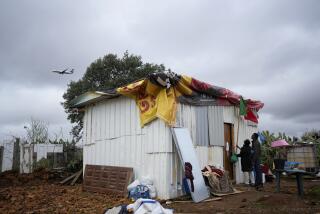Brazil’s New Economic Plan Sends Wealthy on Run to Psychiatrists
- Share via
RIO DE JANEIRO — President Fernando Collor de Mello’s drastic economic plan has Brazilian psychiatrists working overtime to give the nation’s wealthy a shoulder to cry on.
“I’ve been working 14 hours a day since the plan was announced. The rich feel a mixture of panic, astonishment, anger and depression, and they want to talk about it,” said Flavio Gikovate, director of the Institute of Psychotherapy.
Collor decreed his plan March 16, one day after taking office. It set an 18-month freeze on savings accounts of more than $1,200. It also limits withdrawals from money market funds to $600, or 20% of an account, whichever is greater.
The measure froze about $115 billion--80% of all bank deposits.
Most of Brazil’s poor majority were not directly hit, because few had savings that were affected. And with record inflation drastically reduced since the announcement, many of the worse-off say their salary is buying more.
But the wealthy are hurting, financially and psychologically.
According to the prominent news weekly Veja, at least two deaths have resulted directly from Collor’s “New Brazil Plan.”
A Sao Paulo lawyer identified only as Walter Z. had his entire life’s savings frozen in a bank and was unable to pay debts. He shot himself to death three weeks after the plan was decreed.
And 39-year-old Altair Rodrigues, a married father of two who had almost all proceeds frozen from the sale of his Sao Paulo home and bar, died of a heart attack afterward.
Although most wealthy Brazilians have adapted to their new circumstances with less trauma, many are still reeling from the blow.
A joke making the rounds reveals the degree of anger many rich Brazilians feel toward the president.
As the story goes, a businessman was waiting in a long bank line behind irate customers trying to sort out their financial affairs. The businessman finally lost patience, screaming: “That’s it! I’m going to kill Collor!” An hour later he was back at the bank, explaining to the manager, “The line was longer at the presidential palace.”
“For the poor, money is simply a means of buying things. For the rich, money means status. Many of my patients are depressed because they can no longer afford the lifestyle they were accustomed to and feel their social standing has fallen,” Gikovate said.
“Brazil’s rich are very spoiled. The poor have always paid for the country’s difficulties and the wealthy are not used to sacrificing,” he added.
Another Sao Paulo psychiatrist, Marcelo Burkhard Sobrinho, said his workload has increased 40% since the plan was announced.
“I thought I’d lose clients as they’d be short on money, but it’s just the opposite. Those who can’t pay now are begging me to keep them on, with promises that they’ll pay as soon as possible,” he said.
The psychiatrist joked that the content of his sessions had changed so drastically that he was considering taking a class in economics.
“Before the plan, it was the usual talk of sex, love, careers, shyness and insecurities. Now at least 70% of the time my clients talk about the economic plan,” he said.
Rio analyst Jorge Alberto Costa e Silva said the middle class may have been hit harder than the rich.
“Twenty percent of $1,000 is nothing, while 20% of $1 million can go a long way toward easing the pain,” he said, referring to the limit on money market withdrawals.
Costa e Silva, who assumes the presidency of the Geneva-based World Assn. of Psychiatry this month, said the middle class was “orphaned” by Collor’s measures.
“Bank savings gave many people the opportunity to dream, to make plans for the future. That’s been taken away, and for many in the middle class, life now means only eating, working and going to bed,” he said.
The analyst said he knew of at least 10 suicide attempts related to desperation caused by the plan, a number he called “frighteningly high.”
Wealthy Brazilians with AIDS are having an especially difficult time dealing with the bank freeze.
The government allows those who became unemployed because of their illness to make unlimited bank withdrawals. But that accounts for few of the 9,555 confirmed AIDS victims in Brazil, which has one of the world’s highest rates of the disease.
“AIDS is a terminal disease, and those who have it feel they may die at any moment. Knowing their money is blocked for the next 18 months causes tremendous anguish,” said Lahire Dutra de Carvalho Neto, a therapist who counsels AIDS patients at a Rio hospital.
He said many of his clients are bitter because they are unable to travel or make plans to enjoy the time they have left.
“AIDS patients feel that first they were robbed of their lives. Now they say the government is robbing them of their money,” Carvalho Neto said.
More to Read
Sign up for Essential California
The most important California stories and recommendations in your inbox every morning.
You may occasionally receive promotional content from the Los Angeles Times.










